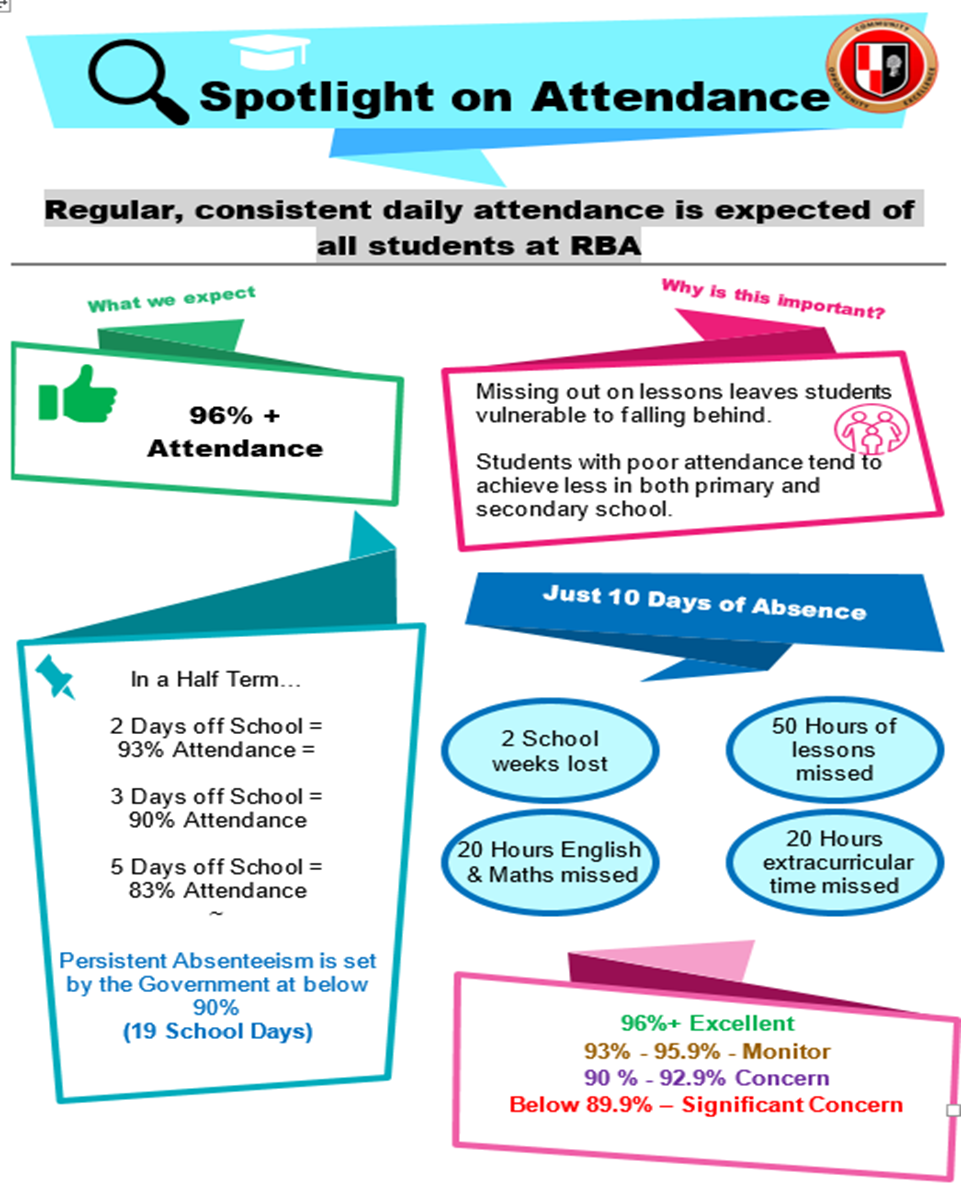School Attendance
Regular, consistent daily attendance is expected of all students at RBA. This is to ensure our outstanding provision is not missed and all students flourish from Year 5 to Year 8. It is the responsibility of the parent/family to ensure their child attends school, but RBA will work with families when barriers occur, such as anxiety or specific medical needs. See our section here for support strategies on school anxious students
| 96 - 100% |
Attendance levels are good to excellent |
| 93 - 95.9% |
Attendance levels beginning to cause concern
|
| 90 - 92.9% |
Attendance levels causing more significant concern
|
| 89.9% or lower |
Attendance decreased to an unacceptable level – below persistent absence rate – despite interventions by school staff
|
Missing out on lessons leaves children vulnerable to falling behind. Children with poor attendance tend to achieve less in both primary and secondary school. The Education (School Day and School Year) (England) Regulations 1999 require all maintained schools to open to educate their pupils for at least 190 days (380 sessions) in each school year.
| Days Absent | Attendance in one school year |
| 9.5 Days | 95% |
| 19 Days | 90% |
| 28.5 Days | 85% |
| 38 Days | 80% |
| 47.5 Days | 75% |
| 57 Days | 65% |
| 66.5 Days | 60% |
In a Half Term, it looks like this:
| Days Absent | Attendance for 6 weeks |
| 2 Days | 93% |
| 3 Days | 90% |
| 5 Days | 83% |
| 8 Days | 73% |
| 10 Days | 67% |
| 15 Days | 50% |
Why is this important
- When a child attends school on a regular basis, they take an important step towards reaching their full potential, and are given the greatest opportunity to learn new things and develop their skills.
- Children who miss school frequently can fall behind with their work and do less well in exams.
- The more time a child spends around other children, whether in the classroom or as part of a school team or club, the more chance they have of making friends and feeling included, boosting social skills, confidence and self esteem.
Points to Remember
- You can only allow your child to miss school if he or she is ill, or if you have advance permission from the school
- Absence requests will only be granted in exceptional circumstances
- You can be fined for taking your child out of school without advance permission from the school

How do I request permission for an absence?
You must submit a request to the school before you arrange for your child to have time away.
If you wish to take your child out of school during term time, you need to submit a formal request to the Head of Year via the school office. The Head of Year will then consider whether to give permission for the absence.
When will absence requests be granted?
Permission for absence will only be granted in exceptional circumstances.
The Principal will consider each absence request individually and decide whether to grant the absence.
The Principal will also decide how many days your child can be away from school if the absence is granted
|
What if I take my child on an unauthorised absence?
If you take your child out of school without advance permission (except where he or she is unwell), you can be fined or even prosecuted.
This could involve:
• A fixed penalty notice of £60 within 21 days, or £120 within 28 days
• A parenting order, education supervision order or school attendance order where your child repeatedly misses school without a good reason.
Why is it important?
Missing two weeks of school for a holiday might not seem like very much, but it can have a big effect on your child’s education.
For example, if your child misses two weeks of school every year, this adds up to more than two terms over the child’s whole time in school.
Making sure your child attends school as much as possible means:
- Your child will have the same education and opportunities as everyone else in the class
- You won’t need to worry about catching up on work, or that your child might fall behind because of missing an important lesson
Your child won’t miss out on activities at the start and end of term, which are often fun and a chance to develop friendships
Legal Framework:
Parents are responsible for making sure that their children of compulsory school age receive a suitable full-time education. This can be by regular attendance at school, at alternative provision, or otherwise (e.g. the parent can choose to educate their child at home).
A child reaches compulsory school age on or after their fifth birthday. If they turn 5 between 1 January and 31 March they are of compulsory school age on 31 March; if they turn 5 between 1 April and 31 August they are of compulsory school age on 31 August. If they turn 5 between 1 September and 31 December, then they are of compulsory school age on 31st December.
School Attendance and Absence - Guidelines
